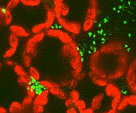Plant Pathology, Department of

Department of Plant Pathology: Faculty Publications
Document Type
Article
Date of this Version
2018
Citation
Front. Plant Sci. 9:615.
Abstract
In Arabidopsis and rice, the ubiquitin ligase PUB13-mediated protein degradation plays a significant role in plant pattern-triggered immunity (PTI) and flowering time control. The Arabidopsis PUB13 has been shown to attenuate the pattern recognition receptor FLS2-mediated immune signaling by ubiquitinating FLS2 and consequently promoting its degradation by the 26S proteasome. Nevertheless, the cognate ubiquitin-conjugating enzymes (E2) with which PUB13 acts to modulate FLS2-mediated PTI are unknown. To address this question, we investigate here the tomato (Solanum lycopersicum) homolog of PUB13, SlPUB13 by utilizing the recently characterized complete set of tomato E2s. Of the 13 groups of tomato E2s, only members in group III are found to interact and act with SlPUB13. Knocking-down of the group III E2 genes enhances callose deposition and induction of the RbohB gene in the immunity-associated, early oxidative burst after flg22 treatment. The group III E2s are also found to work with SlPUB13 to ubiquitinate FLS2 in vitro and are required for PUB13-mediated degradation of FLS2 in vivo upon flg22 treatment, suggesting an essential role for group III E2s in the modulation of FLS2- mediated immune signaling by PUB13. Additionally, another immunity-associated E3, NtCMPG1 is shown to also work specifically with members of group III E2 in the in vitro ubiquitination assay, which implies the group III E2 enzymes may cooperate with many E3 ligases to regulate different aspects of PTI. Taken together, these data corroborate the notion that group III E2 enzymes play an important role in PTI and build a foundation for further functional and mechanistic characterization of tomato PUB13.


Comments
Copyright © 2018 Zhou and Zeng.
Open access
doi: 10.3389/fpls.2018.00615